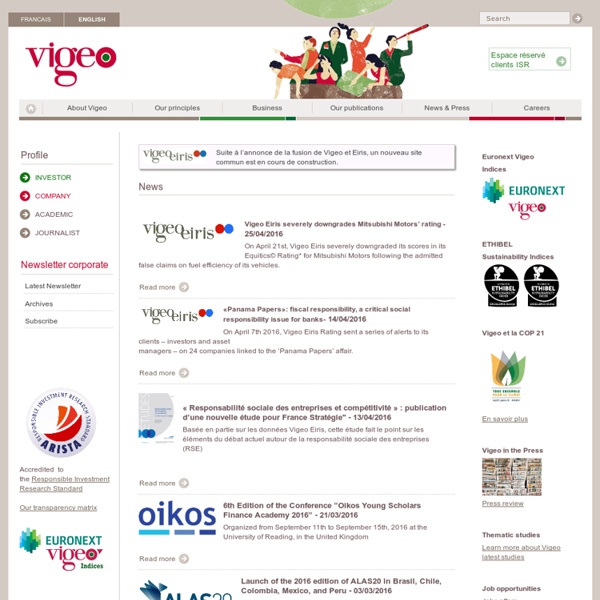



La Nef .: Accueil :. Votre partenaire financier pour une économie plus humaine adie ISO Social Responsibility This Website was the one used and maintained by the ISO Working Group on Social Responsibility during its development of ISO 26000, Guidance on social responsibility. It is being retained as a reference source because of the wealth of background and archive material it contains. However, it will no longer be updated since it is now replaced by the regularly updated "Social responsibility" section under "Management standards" on ISO Online at www.iso.org/sr ISO, the International Organization for Standardization, has decided to launch the development of an International Standard providing guidelines for social responsibility (SR). The guidance standard will be published in 2010 as ISO 26000 and be voluntary to use. It will not include requirements and will thus not be a certification standard. There is a range of many different opinions as to the right approach ranging from strict legislation at one end to complete freedom at the other. We invite you to come and learn more about SR.
Reporting RSE - Développement durable PhiTrust Active Investors - Donnez du sens à vos investissements - Société de gestion d'actifs - Engagement Actionnarial SRI in the Rockies « Ethique et entreprise, des premières incitations réglementaires à la quête des nouveaux consommateurs » | LA NOUVELLE ÉCOLOGIE MANAGÉRIALE (Suite de l’article de l’Expansion Management Review) L’entreprise capitaliste par essence cherche le profit et c’est avant tout son encadrement juridique ou normatif qui la guide vers l’éthique, mais aussi le positionnement du consommateur. La réglementation mondiale tardant à s’imposer, l’éthique entre néanmoins timidement en entreprise. Ainsi aujourd’hui les normes de production qualité ISO 26 000[1] intègrent-elles l’éthique dans leur réglementation. Par ailleurs, depuis quelques années, l’éthique émerge dans certains grands groupes industriels, comme une fonction de l’organisation[2]. Enfin, sont apparus depuis peu des baromètres de l’éthique. Certains diront que ces démarches sont avant tout marketing, permettant surtout aux industries de se donner bonne conscience et de redorer leur image. Pour être plus positif, cela montre que, malgré une marge de manœuvre limitée, la question est prise très au sérieux par certaines grandes sociétés.
Investments that make you proud | microfinance at MicroPlace Banque mondiale This page in: Indicators Agriculture & Rural Development Aid Effectiveness Climate Change Climate Change Knowledge Portal Economy & Growth Household Consumption Data and Statistics Education Education Statistics: EdStatsService Delivery Indicators Energy & Mining Energy & Extractives Open Data Platform Environment External Debt Debt Data Financial Sector Financial Inclusion Gender Gender Equality Data & Statistics Health HealthStatsService Delivery Indicators Infrastructure Poverty Poverty & Equity Data Private Sector Doing BusinessEnterprise SurveysHousehold Consumption Data and Statistics Public Sector Data on Statistical CapacityCountry Policy & Institutional Assessments Science & Technology Social Development Social Protection & Labor ASPIRE: The Atlas of Social ProtectionJobs Data Trade WITS: World Integrated Trade Solution Urban Development Help us improve this site © 2016 The World Bank Group, All Rights Reserved.
Transparence des entreprises : "peut mieux faire" LA PROPOSITION EUROPÉENNE DE DIRECTIVE SUR LA TRANSPARENCE DES ENTREPRISES N’EST PAS ASSEZ VOLONTARISTE POUR AMÉLIORER LE COMPORTEMENT SOCIÉTAL DES ENTREPRISES Une proposition de directive publiée le 16 avril par la Commission européenne, visant à obtenir des grandes entreprises européennes des rapports sur leurs impacts sociaux et environnementaux [1], est jugée insuffisante par la European Coalition for Corporate Justice (ECCJ) pour garantir un comportement éthique des entreprises. ECCJ est une coalition européenne représentant 250 organisations dans 15 pays européens, dont le Forum citoyen pour la responsabilité sociale des entreprises (FCRSE) en France. Comme le Forum Citoyen, ECCJ réclame depuis des années des règles précises pour encadrer la transparence des entreprises. ECCJ voit dans cette nouvelle directive sur le reporting extra-financier une première étape positive – actant la nécessité d’une transparence accrue quant aux impacts des activités des entreprises.
Connaître le Groupe ESFIN-IDES OCDE Microloans to Africa | Grow business through microfinance